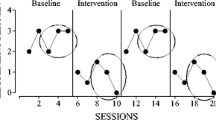Abstract
The present study evaluated the effectiveness of noncontingent reinforcement combined with extinction in the treatment of perseverative speech of an 11-year-old boy with autism spectrum disorder. Following a functional analysis that suggested perseverative speech was maintained by attention, treatment was introduced and consisted of delivering attention on a fixed-time schedule and placing perseverative speech on extinction. The intervention resulted in a 98.5% decrease in perseverative speech, which maintained over a 28-month period.

Similar content being viewed by others
References
Buchanan, J. A., & Fisher, J. E. (2002). Functional assessment and noncontingent reinforcement in the treatment of disruptive vocalizations in elderly dementia patients. Journal of Applied Behavior Analysis, 35, 99–103.
Carr, J. E., Severtson, J. M., & Lepper, T. L. (2009). Noncontingent reinforcement is an empirically supported treatment for problem behavior exhibited by individuals with developmental disabilities. Research in Developmental Disabilities, 30, 44–57. https://doi.org/10.1016/j.ridd.2008.03.002.
DeLeon, I. G., Williams, D., Gregory, M. K., & Hagopian, L. P. (2005). Unexamined potential effects of the noncontingent delivery of reinforcers. European Journal of Applied Behavior Analysis, 6, 57–69. https://doi.org/10.1080/15021149.2005.11434250.
Ferguson, J. L., Cihon, J. H., Leaf, J. B., Van Meter, S. M., McEachin, J., & Leaf, R. (2019). Assessment of social validity trends in the Journal of Applied Behavior Analysis. European Journal of Behavior Analysis, 20, 146–157. https://doi.org/10.1080/15021149.2018.1534771.
Iwata, B. A., Dorsey, M. F., Slifer, K. J., Bauman, K. E., & Richman, G. S. (1994). Toward a functional analysis of self-injury. Journal of Applied Behavior Analysis, 27, 197–209.
Noel, C. R., & Rubow, C. C. (2018). Using noncontingent reinforcement to reduce perseverative speech and increase engagement during social skills instruction. Education and Treatment of Children, 41(2), 157–168.
Richman, D. M., Barnard-Brak, L., Grubb, L., Bosch, A., & Abby, L. (2015). Meta-analysis of noncontingent reinforcement effects on problem behavior. Journal of Applied Behavior Analysis, 48, 131–152. https://doi.org/10.1002/jaba.189.
Saini, V., Fisher, W. W., & Pisman, M. D. (2017). Persistence during and resurgence following noncontingent reinforcement implemented without extinction. Journal of Applied Behavior Analysis, 50, 377–392. https://doi.org/10.1002/jaba.380.
Tomlin, M., & Reed, P. (2012). Effects of fixed-time reinforcement delivered by teachers for reducing problem behavior in special education classrooms. Journal of Behavioral Education, 21, 150–162. https://doi.org/10.1007/s10864-012-9147-z.
Author information
Authors and Affiliations
Corresponding author
Ethics declarations
Conflict of interest
The authors declare they have no conflict of interest.
Ethical approval
Ethical approval was waived by the Chicago School of Professional Psychology’s Institutional Review Board in view of the retrospective nature of the study, and all the procedures performed were part of the participant’s routine applied behavior analysis–based behavioral therapy.
Informed consent
Written informed consent was obtained from the participant’s legal guardian.
Additional information
Publisher’s Note
Springer Nature remains neutral with regard to jurisdictional claims in published maps and institutional affiliations.
Research Highlights
• Noncontingent reinforcement is the time-based, response-independent delivery of known reinforcers.
• A functional analysis should be conducted to confirm whether problem behavior is maintained by social versus nonsocial reinforcement.
• Thinning the schedule of noncontingent reinforcement can promote the maintenance of treatment effects.
• Practitioners should consider combining noncontingent reinforcement with extinction for enhanced treatment outcomes.
Rights and permissions
About this article
Cite this article
Migan-Gandonou Horr, J.A., Michael, A.V. Functional Analysis and Noncontingent Reinforcement With Extinction in the Treatment of Perseverative Speech. Behav Analysis Practice 14, 208–213 (2021). https://doi.org/10.1007/s40617-020-00523-x
Accepted:
Published:
Issue Date:
DOI: https://doi.org/10.1007/s40617-020-00523-x




